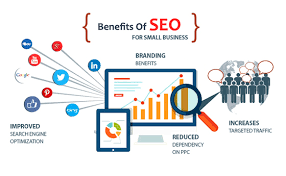The Importance of SEO in E-commerce
In the competitive world of e-commerce, having a strong online presence is crucial for success. Search Engine Optimization (SEO) plays a vital role in driving organic traffic to your e-commerce website and increasing visibility among potential customers.
Enhanced Visibility
Implementing effective SEO strategies can help your e-commerce site rank higher in search engine results pages (SERPs). By optimizing your website with relevant keywords, meta tags, and quality content, you can improve your chances of being found by users searching for products or services that you offer.
Increased Traffic and Conversions
Higher visibility in search results leads to increased organic traffic to your e-commerce site. As more users discover your website through search engines, you have a greater opportunity to convert them into paying customers. By providing valuable information, optimizing product pages, and streamlining the checkout process, you can improve the user experience and boost conversion rates.
Competitive Advantage
Effective SEO can give your e-commerce business a competitive edge by helping you stand out from competitors in the online marketplace. By staying up-to-date with algorithm changes, monitoring keyword trends, and analyzing competitor strategies, you can continuously optimize your website to attract more visitors and drive sales.
Brand Awareness and Credibility
Building a strong online presence through SEO not only increases visibility but also enhances brand awareness and credibility. When users see your website listed at the top of search results for relevant queries, they are more likely to trust your brand and consider it as a reputable source for their needs.
Conclusion
In conclusion, SEO is essential for the success of e-commerce businesses looking to thrive in today’s digital landscape. By investing time and resources into optimizing your website for search engines, you can attract more visitors, increase conversions, gain a competitive advantage, and build brand credibility. Make SEO a priority in your e-commerce strategy to achieve long-term growth and success.
9 Essential SEO Tips for Enhancing Your E-commerce Site’s Performance
- Optimize product titles with relevant keywords
- Create unique and compelling product descriptions
- Use high-quality images with descriptive filenames
- Optimize your website speed for better user experience
- Implement a clear site structure for easy navigation
- Utilize internal linking to improve SEO performance
- Optimize meta tags including title tags and meta descriptions
- Generate XML sitemaps to help search engines index your site
- Regularly monitor and analyze your SEO performance to make necessary adjustments
Optimize product titles with relevant keywords
Optimizing product titles with relevant keywords is a crucial SEO strategy for e-commerce websites. By incorporating high-traffic keywords that accurately describe the products you offer, you increase the chances of your products appearing in search engine results when potential customers are actively looking to make a purchase. This optimization not only improves the visibility of your products but also helps search engines understand the relevance of your offerings, ultimately driving more organic traffic to your e-commerce site and boosting conversions.
Create unique and compelling product descriptions
Creating unique and compelling product descriptions is a crucial aspect of SEO in e-commerce. By crafting original and engaging content for each product, you not only provide valuable information to potential customers but also improve your website’s search engine ranking. Unique product descriptions help differentiate your offerings from competitors and can enhance the overall user experience on your site. Including relevant keywords in these descriptions can also boost visibility in search results, driving organic traffic and ultimately leading to higher conversion rates. Invest time and effort into creating compelling product descriptions to effectively showcase your products and attract more customers to your e-commerce store.
Use high-quality images with descriptive filenames
Utilizing high-quality images with descriptive filenames is a crucial tip for improving SEO in e-commerce. When you use visually appealing and relevant images on your website, it not only enhances the user experience but also provides search engines with valuable content to index. By naming your image files descriptively using relevant keywords, you can improve the chances of your products appearing in image search results, driving more organic traffic to your e-commerce site. High-quality images with descriptive filenames not only attract potential customers but also contribute to better SEO rankings, making it a win-win strategy for boosting visibility and conversions in the competitive online marketplace.
Optimize your website speed for better user experience
Optimizing your website speed is a crucial aspect of SEO in e-commerce. A fast-loading website not only improves search engine rankings but also enhances the overall user experience. When visitors can access your site quickly and efficiently, they are more likely to stay engaged, explore your products or services, and complete transactions. By prioritizing website speed optimization, you can reduce bounce rates, increase conversions, and ultimately drive success for your e-commerce business.
Implement a clear site structure for easy navigation
Implementing a clear site structure is a crucial tip for successful SEO in e-commerce. By organizing your website in a logical and user-friendly manner, you not only make it easier for visitors to navigate through your site but also improve search engine crawlers’ ability to index and understand your content. A well-structured site with clear categories, subcategories, and internal linking can enhance the user experience, increase engagement, and ultimately boost your site’s visibility in search results.
Utilize internal linking to improve SEO performance
Utilizing internal linking is a powerful strategy to enhance SEO performance in e-commerce. By strategically linking relevant pages within your website, you can improve site navigation, establish a hierarchy of importance for search engines, and distribute link equity throughout your site. Internal linking helps search engine crawlers discover and index content more efficiently, leading to improved visibility and ranking potential for key pages. Additionally, it can increase user engagement by guiding visitors to related products or information, ultimately enhancing the overall user experience and driving conversions. Incorporating internal linking as part of your SEO strategy can significantly impact your e-commerce website’s performance and contribute to long-term success in the digital marketplace.
Optimize meta tags including title tags and meta descriptions
Optimizing meta tags, including title tags and meta descriptions, is a crucial aspect of SEO in e-commerce. Title tags help search engines understand the content of your web pages, while meta descriptions provide a brief summary that entices users to click on your link in search results. By crafting compelling and relevant meta tags with targeted keywords, you can improve your website’s visibility, attract more organic traffic, and increase click-through rates. Effective optimization of meta tags can enhance the overall user experience and contribute to higher rankings in search engine results pages, ultimately driving more conversions for your e-commerce business.
Generate XML sitemaps to help search engines index your site
Generating XML sitemaps is a crucial tip for enhancing SEO in e-commerce. By creating XML sitemaps, you provide search engines with a roadmap to easily crawl and index all the pages on your website. This helps search engines discover and understand the structure of your site, leading to improved visibility and higher rankings in search results. XML sitemaps also enable you to prioritize important pages for indexing, ensuring that your most valuable content is properly recognized by search engines, ultimately driving more organic traffic to your e-commerce site.
Regularly monitor and analyze your SEO performance to make necessary adjustments
Regularly monitoring and analyzing your SEO performance is crucial for optimizing your e-commerce website’s visibility and driving organic traffic. By keeping a close eye on key metrics such as keyword rankings, website traffic, conversion rates, and user engagement, you can identify areas that need improvement and make necessary adjustments to your SEO strategy. This proactive approach allows you to stay ahead of the competition, adapt to changing search engine algorithms, and ensure that your e-commerce site continues to attract qualified leads and generate sales effectively.




